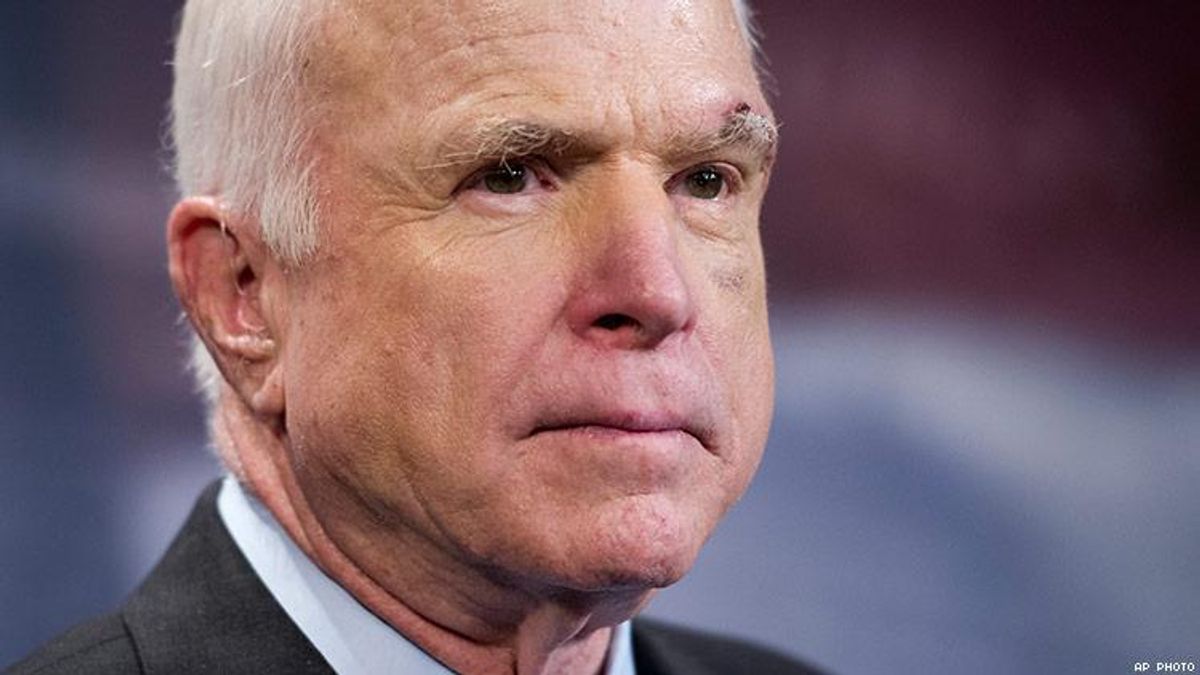John McCain, the six-term U.S. senator from Arizona and onetime presidential candidate, has died at the age of 81.
McCain had suffered from aggressive glioblastoma, a form of brain cancer, for more than a year. He had surgery for a blood clot in his brain in July 2017, shortly after his diagnosis. His family announced August 24 that while he had "surpassed expectations" for survival, he decided to discontinue treatment. "The progress of disease and the inexorable advance of age render their verdict," the family wrote.
McCain was not always a supporter of LGBTQ rights, and he generally received low scores on the Human Rights Campaign's Congressional Scorecard. But he became more of an ally as his career went on. When the "don't ask, don't tell" policy was repealed in 2010, allowing lesbian, gay, and bisexual people to serve openly in the military, he called it a "sad day." But six years later, he opposed an amendment to a defense spending bill that would have undermined President Obama's executive order banning anti-LGBTQ discrimination by federal contractors. The amendment was stripped from the final bill. He also supported Eric Fanning, the gay man nominated by Obama to be secretary of the Army, and Fanning was eventually confirmed by the Senate.
"McCain has changed because much of the country has shifted, including the GOP," Princeton University political historian Julian Zelizer told NBC News in 2016. "Support for LGBT rights is incredibly strong and even within the military opinion has changed dramatically in recent years. In part, 'don't ask, don't tell, a watered-down compromise, opened the door for new attitudes and more reform. McCain has adjusted to these changes and as the leader of the Armed Services Committee has a powerful position to act as a firewall."
Last year, he stood up against Donald Trump's efforts to bar transgender people from serving in the military. "Any member of the military who eets the medical and readiness standards should be allowed to serve -- including those who are transgender," McCain said in September 2017. He also signed on to a bipartisan bill that would stop the ban. It has yet to pass, but the ban is currently blocked by federal courts while lawsuits against it are being heard.
In 2013, he wrote a commentary piece for Russian website Pravda.ru condemning Russia's homophobia, saying the nation's leaders "write laws to codify bigotry against people whose sexual orientation they condemn." That was the year Russia passed its national law banning "propaganda of nontraditional sexual relations" in venues accessible to minors, essentially outlawing any positive public mention of LGBTQ rights or identities. The same year, McCain voted in favor of the LGBTQ-inclusive Employment Non-Discrimination Act, but it has yet to become law.
He opposed a federal constitutional amendment to ban same-sex marriage, saying the matter should be left to the states. He did support state efforts to ban it, however. In 2008, when he was running for president against Obama, he spoke out in favor of California's Proposition 8, an anti-marriage equality ballot measure that voters ultimately passed, revoking equal marriage rights in the state until Prop. 8 was overturned in court. "I support the efforts of the people of California to recognize marriage as a unique institution between a man and a woman, just as we did in my home state of Arizona," he said in 2008.
That year his running mate was Sarah Palin, the first female GOP nominee for vice president. A favorite of the religious right, Palin was widely viewed as no friend to LGBTQ people, even though she claimed to have gay friends, one of whom turned out to be her college roommate. Palin has notably defended Curt Schilling, a former Major League Baseball player who was fired as an ESPN commentator for posting transphobic memes, and Chick-fil-A, the fast-food chain known for funding anti-LGBTQ causes.
Other close associates of McCain have been more LGBTQ-supportive, with his wife, Cindy, and daughter Meghan becoming outspoken allies.
John McCain was first elected to the Senate in 1986, after serving two terms in the U.S. House of Representatives. He was born into a family with a history of military service, and he continued that tradition, graduating from the U.S. Naval Academy in 1958. He became a naval aviator and volunteered for combat duty during the Vietnam War. He was captured by the North Vietnamese when his plane was shot down in 1967, and he spent five and a half years as a prisoner of war. He served in the Navy until 1981.
He challenged George W. Bush for the Republican presidential nomination in 2000 but supported Bush's reelection in 2004. McCain became the party's nominee in 2008 but lost to Obama.
He returned triumphantly to Congress after his July 2017 surgery, famously casting a crucial vote that month that helped block the repeal of the Affordable Care Act, one of the signature achievements of Obama's presidency. However, his condition worsened in the fall, and he had been absent from Congress since December.


















































































Fans thirsting over Chris Colfer's sexy new muscles for Coachella